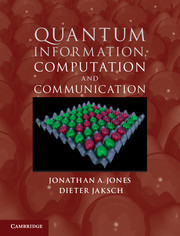16 - Testing EPR
from Part III - Quantum communication
Published online by Cambridge University Press: 05 August 2012
Summary
Quantum physics violates the basic assumptions of local realism. Particles can be entangled with each other in ways that allow correlations stronger than possible in classical physics. This was first realized by Einstein, Podolsky and Rosen (EPR) in 1935 and led them to conclude that quantum theory was incomplete. It took about 30 years before J. S. Bell found observable consequences of this phenomenon by showing how entangled states violate inequalities for two-particle correlations derived purely from the assumption that the world obeys local realism.
Violations of Bell inequalities were first observed experimentally in the Aspect experiment, which will be discussed below. Such experiments are technically challenging and care is needed to avoid any loopholes in the experimental setup that would still permit the description of the experiments by a local realistic theory.
Bell inequalities describe violations of local realism on average, meaning that each individual experimental outcome could occur in a local realistic theory. It is the statistics of these outcomes that violates local realism. In contrast, another class of quantum states, so-called Greenberger–Horne–Zeilinger (GHZ) states, which contain three particles, can be shown to violate local realism in each measurement outcome. We will also discuss this class of states and experiments by Zeilinger's group, which demonstrated this type of violation of local realism for the first time.
Our aim here is not to discuss the exact relations between quantum entanglement, non-locality and realism, and their physical and philosophical implications. While this is a highly interesting topic which attracts a lot of attention from researchers, such an exploration would go beyond the scope of this book.
- Type
- Chapter
- Information
- Quantum Information, Computation and Communication , pp. 163 - 170Publisher: Cambridge University PressPrint publication year: 2012



